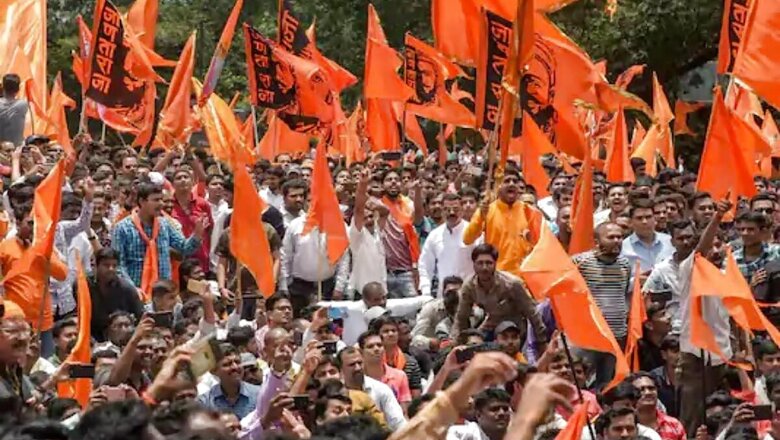
views
The Supreme Court on Wednesday struck down the Maharashtra law granting quota to Marathas in admissions and government jobs, terming the statute as “unconstitutional”.
It also refused to refer the 1992 Mandal judgement, setting a 50 per cent cap on reservation, to a larger bench for reconsideration.
Following is the chronology of events pertaining to the Maratha quota case:
June 2017: Maharashtra government constitutes State Backward Class Commission to study the social, financial and educational status of Maratha community.
July 2018: Sporadic violence across Maharashtra by the Maratha community demanding quota in education and government jobs.
November 15, 2018: Commission submits its report to the Maharashtra government.
November 30, 2018: Maharashtra legislature passes a bill proposing 16 per cent reservation in education and government jobs for Maratha community, declared as socially and educationally backward class by the government.
November 30, 2018: Maharashtra Governor C Vidyasagar Rao approves and signs the bill.
December 3, 2018: Bunch of petitions filed in Bombay High Court challenging the quota decision, and terms it as violative of the Supreme Court orders which says that reservation in any state should not exceed over 50 per cent.
December 5, 2018: Bombay High Court refuses to grant interim stay on the quota decision but posts petitions for final hearing.
January 18, 2019: Maharashtra government files affidavit, standing by its decision to grant reservation to the Maratha community, and says it was meant to alleviate the “socially and economically” backward class.
February 6, 2019: A division bench of Justices Ranjit More and Bharati Dangre commences final hearing into all petitions pertaining to the Maratha reservation issue.
March 26, 2019: HC concludes hearing arguments in the petitions. Reserves its judgment.
June 24, 2019: HC says it would pronounce its verdict on the petitions on June 27.
June 27, 2019: HC upholds constitutional validity of reservation for the Maratha community, but asks the government to reduce it from 16 per cent to 12 to 13 per cent, as recommended by the State Backward Classes Commission. The Bombay High Court, in its June 27 order, had said the 50 per cent cap on total reservations imposed by the Supreme Court could be exceeded in exceptional circumstances.
On July 29, 2019: The Supreme Court agreed to consider urgent hearings to the petitions challenging the constitutional validity of a Maharashtra law that grants reservation to the Maratha community. A bench headed by the then Chief Justice Ranjan Gogoi took note of the submissions.
August 26, 2020: The Supreme Court was urged to set up a 11-judge Bench to reconsider its 50% cap on reservation. The push for it came while the court was hearing a challenge to the Maratha reservation law.
8 September, 2020: The Supreme Court on Wednesday directed that no quota will be granted to people of the Maratha community in education and jobs in the state this year. It also referred the hearing on a batch of plea challenging the constitutional validity of a Maharashtra law granting Maratha reservation in education and jobs to a larger bench.
21 September, 2020: The Maharashtra government filed an application before a larger bench of the Supreme Court, seeking vacation of the apex court’s stay on implementation of Maratha quota in jobs and education.
9 December, 2020: The Supreme Court said that issues pertaining to 2018 Maharashtra law, granting reservation to Marathas in education and jobs, requires ‘urgent hearing’ as the legislation has been stayed and the ‘fruits accrued’ are not reaching to the people.
26 March, 2021: The Supreme Court reserved its judgement on petitions challenging the constitutional validity of Maratha quota. A five-judge Constitution Bench comprising Justices Ashok Bhushan, L Nageswara Rao, S Abdul Nazeer, Hemant Gupta and Ravindra Bhat also reserved the judgement on the issue of whether the top court’s 1992 verdict for capping reservation at 50 per cent needs re-examination.
Read all the Latest News, Breaking News and Coronavirus News here. Follow us on Facebook, Twitter and Telegram.

















Comments
0 comment